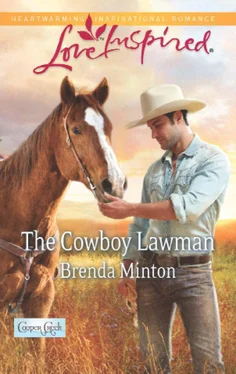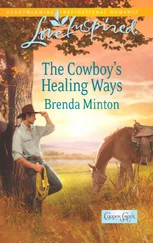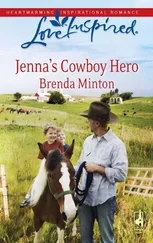Jackson’s truck turned a short distance ahead, but his words had opened the wound. Tears blurred her vision and her throat burned. She kept jogging. She kept pushing.
She brushed at the tears that continued to flow. It ached. It ached every minute of every day. Even in her dreams it hurt. She stopped running and looked up at the clear blue sky, at birds flying overhead.
“It hurts!” she yelled as loudly as she could. And then more quietly: “Make it stop. Make it all go away.”
There was no answer. Of course there wasn’t. God had stopped listening. For some reason He had ignored her when she pleaded for help, holding her hand on Butch’s chest, trying to stop the flow of blood, crying as she told him to hold on.
She closed her eyes and slowly sank to her knees in the grass on the shoulder of the road, not caring who came by, what people said about her. It didn’t matter. Why should it matter when she hadn’t been able to save her partner, her friend’s life?
A car pulled up behind her. She didn’t turn. She didn’t want to know who had found her like this.
A door shut. Footsteps crunched on the gravel shoulder of the road. She wiped a hand across her face and looked up at the person now standing in front of her, blocking the sun, leaving his face in shadows. He smiled a little but his dark gray eyes mirrored her sorrow. He held out a hand.
“It gets easier.” His voice was gruff but soft.
“Does it?” She didn’t think it would. Today it felt as if it would always hurt like this.
She took his hand.
“Yeah, it does. Is this your first cry?”
She nodded and the tears started again. His hand clasped her left hand. She stood and he pulled her close in an awkward embrace. His hand patted her back and then he stepped away, cleared his throat and looked past her.
“Let me give you a ride home.”
She noticed then that he was in his uniform. He’d been a county deputy for ten years. He’d been the second officer on the scene the night his wife died in a car accident.
“Thanks.” She walked back to his car. He opened the passenger-side door for her. Before getting in, she stared up at him, at a face she knew so well. She knew his gray eyes, the way his mouth was strong but turned often in an easy smile. She also knew his pain. “It feels like it might hurt forever.”
“I know.”
* * *
They made the trip back to Mia’s in silence. Slade McKennon glanced Mia’s way from time to time, but he didn’t push her to talk. Their situations were different, but he knew how hard it was to talk when the grief hit, when your throat felt so tight it hurt to take a breath. He knew how hard it was to make sense of it all.
He knew how angry you could get and how every time you opened your mouth, you wanted to yell at God or cry until you couldn’t cry any more.
He pulled into her driveway and they sat there a long time, just sitting, staring at her garage in front of them. Finally, she turned to face him, her eyes still watery, rimmed with red from crying. Her dark brown hair framed her face, her normally dark skin looked a shade or two paler.
Tall and slim, athletic, she’d always been an overachiever, the girl who thought she could do it all. And did. She’d been a star basketball player. She’d ridden barrels all the way to nationals, three times. She’d won the whole thing once.
Now she looked as broken as a person could get, but she still had fighter written all over her.
“Remember when Vicki used to tell you to just go ahead and cry?” He smiled as he remembered his wife, her best friend. That was what time did for a person—it made the memories easier, made smiling easier.
“Yeah, she used to do that. When I broke my ankle, sprained my wrist, had a concussion. Cry, she’d say.” She rubbed her hand over her face. “But it didn’t make sense to cry over it. Pain is an emotion.”
Instead of crying, Mia would just get mad. A defense mechanism he guessed from her tough childhood, pre-Coopers. She reached for the door of his patrol car. He knew he wouldn’t get much further with her, but he had to try.
“Mia, she would tell you to have faith.”
“Don’t.” She opened the door and looked back at him, one foot on the paved driveway. “Don’t give me the easy answers, the platitudes. It doesn’t help. I can pray. I can have faith. I can believe in God to do all things. But there is one thing that won’t happen.”
“I know.”
She closed her eyes and the tense lines of her face eased. She reached across the car for his hand and held it tight. “I know you do.”
“But I promise you, those words are more than platitudes. It doesn’t feel like it right now, but it is going to get easier.”
“Come in for a cup of coffee?”
Okay, she wanted to change the subject. He radioed in that he’d be out of his car but available on his cell phone. Dispatch responded and he pulled the keys out of the ignition. Yeah, he did that every single time.
Mia saw the keys go in his pocket and she laughed. With watery eyes and red streaks where tears had made trails down her cheeks, she laughed. He smiled and shrugged, he’d take the humiliation if it made her feel better.
“A guy only makes that mistake once.” He stepped out of his car.
“You know that Gage and Dylan did that to you.”
“Yeah, I know.”
Her brothers had hidden his patrol car. He’d been a deputy for two months and those two brothers of hers had spotted his car at the Convenience Counts convenience store, keys in the ignition. He’d been inside grabbing a corn dog and when he walked out, his car was gone. After fifteen minutes of searching on foot, he’d had to radio it in to dispatch. A BOLO, “be on the lookout,” for a police car.
Reese Cooper had come along a short time later and told Slade his car was parked at the rodeo grounds. Slade and Reese found the car just as three patrol cars zoomed in.
For several years the other deputies had called him BOLO. They still liked to bring it up from time to time.
Mia met him on the sidewalk, her smile still in evidence.
“Nighttime is the worst,” she admitted as she walked up the steps to her front porch.
“I know.” He had to tell her why he’d come looking for her. And he wasn’t looking forward to it.
“I don’t drink coffee,” she said as she unlocked the door to her house.
He followed her through the living room to the kitchen. He hadn’t been inside her house before today. He didn’t know why. He guessed because Vicki and Mia had been best friends. But he and Mia had been friends, too. They’d grown up together. They’d trailered to rodeos together, a bunch of kids sleeping in the backs of trucks and trailers during those two-day events.
After Vicki’s death, he’d been wrapped up in making his life work, in being a dad to his infant son, and Mia had taken a job with a DEA drug task force that required undercover work.
He had to tell her why he was here.
In the kitchen she bent to pull a coffeemaker out of the cabinet. He reached to help her. She smiled a little and backed up, letting him put it on the counter.
“What are they saying about your arm?”
She ran the coffeemaker under warm water and then filled it with cold water. He plugged in the machine and stepped back as she did a decent job, left-handed, of pouring water into the reservoir and then fitting a filter into the holder.
“Well, it’s held together with a plate and screws. They did what they could for the damaged nerves.” She looked down at her splinted wrist and shrugged. “I can start physical therapy pretty soon.”
“What about your job?” He measured coffee into the filter and hit the power button. “Will you stay with the DEA?”
Читать дальше












